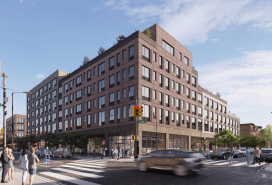The 7 questions all buyers should ask
Recently we ran broker-blogger Malcolm Carter’s take on 10 things buyers forget to ask.
Now we present a legal perspective: Ron Gitter, the real estate lawyer behind coopandcondo.com, identifies 7 unpleasant surprises that may trigger purchase interruptus if caught in time, and a terminal case of buyer’s remorse if not.
1. Windows that are potentially walls
Check the “Special Risks” section of the offering plan for your coop or condo, including the floor plan that is attached as an exhibit, to see if any side-facing or rear-facing windows are “lot line" windows.
When buildings are constructed on or close to the property line, you may have to brick them up (at your expense) if another building is constructed on the adjacent property.
Hint: Whenever you see “home office” or “study” on the floor plan, or if certain windows have wire mesh in them or a sprinkler head directly above the window, check for existence of lot line windows.
Nearly as traumatic as amputating a window is losing a coveted view—or living through two years of bone-rattling construction noise: Be wary of nearby vacant lots, low-rise buildings and parking facilities.
2. Unfinished renovation business
If the apartment has been extensively renovated or if units have been combined, see that the seller delivers a “Certificate of Completion” covering all of the upgrades to the apartment as well as the legalization of the combination.
If not, you could be required to complete the sign-off when you undertake your own renovation, or worse, a subsequent purchaser may require you to round up the missing sign-offs before the closing can take place. Legalizing a previous owner’s renovations, particularly if the work occurred a number of years ago, can be expensive and complicated.
3. An excess of credit
If the seller has an outstanding home equity line of credit, your bank will require the line to be “frozen,” so that the seller can’t use it on and after the closing date. Freezing a line of credit can take a few weeks and should not be left for the last minute. Not frozen=not closing.
4. Life after tax abatements
Tax abatements that apply to many newly constructed condos reduce a buyer’s costs, which is a good thing. But abatements are reduced each year as the real estate taxes are phased in, and eventually, you will be obliged to pay the full amount of real estate taxes multiplied by all the interim increases to assessed values and tax rates imposed by New York City. That not only hurts in the pocketbook—it can also lower your property values.
One more caveat: The Offering Plan shows that the sponsor has applied for a particular abatement; it doesn’t guarantee the abatement will actually happen.
5. Flighty lenders
Mortgage contingencies—giving buyers the right to walk away with their deposits if they’re not approved for a mortgage—are de rigeur these days. But you should also insist on a “funding contingency,” particularly if you’re a first-time buyer obtaining private mortgage insurance a.k.a. "PMI”. Even if you have a loan commitment, your bank can refuse to fund the loan at some point before the closing, especially if PMI is not available. It happens.
6. Empty commercial spaces
When you buy a new construction condo with empty commercial space, be aware that the future tenant may not meet your expectations. Exhibit One: A twenty-four hour hair salon or dance studio.
7. Bed bugs
They’re back. But co-ops, condos and their managing agents are cagey when it comes to disclosing them, so be sure that the contract contains a representation that no infestation of any kind has occurred in the apartment and question the property manager thoroughly to insure that bed bugs are not located anywhere in the building, particularly in or about the apartment in question.
For more on what to investigate before you sign a contract, check out these tips from coopandcondo.com on doing due diligence right.
Related posts:




























